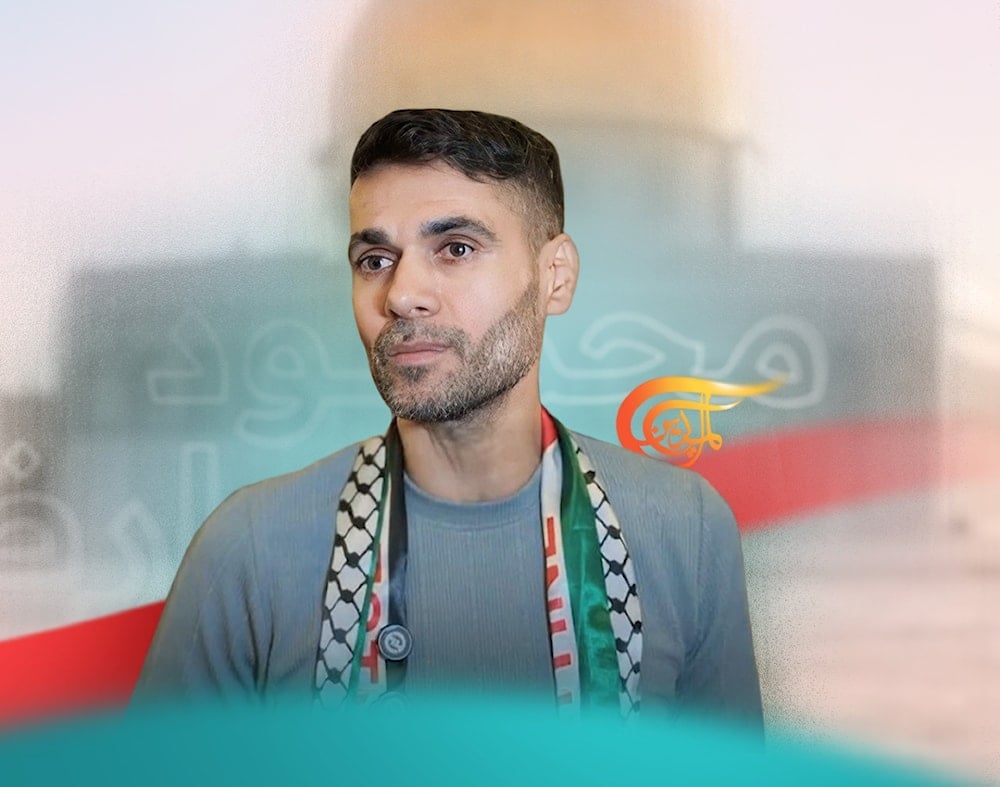Exclusive: Freed Mahmoud al-Arida on prison torture, Op Freedom Tunnel
Freed Palestinian detainee Mahmoud al-Arida speaks to Al Mayadeen about Operation Freedom Tunnel and torture in Israeli prisons, calling for solidarity with the Palestinian cause.
-

Freed Palestinian detainee Mahmoud al-Arida, upon his release by "Israel" after the ceasefire agreement in Gaza (Illustrated by Ali al-Hadi Shmeiss for Al Mayadeen English)
Freed Palestinian detainee Mahmoud al-Arida, in an interview for Al Mayadeen, has detailed the severe abuse and torture Palestinian detainees face in Israeli prisons, recounted breaking out of Gilboa Prison along with his comrades under Operation Freedom Tunnel, and made a powerful call for solidarity with the Palestinian cause.
Al-Arida confirmed that all means of communication were completely cut off and that the detainees involved in Operation Freedom Tunnel - the 2021 prison break from Gilboa Prison - were isolated from the other detainees to prevent any information from getting out.
In an exclusive interview for #AlMayadeen, freed Palestinian detainee and one of the leaders behind Operation Freedom Tunnel, Mahmoud al-Arida, reflects on the indescribable shock of regaining freedom after decades in solitary confinement.
— Al Mayadeen English (@MayadeenEnglish) October 17, 2025
From the darkness of isolation to the… pic.twitter.com/uVR9XfQku3
In his interview for Al Mayadeen, al-Arida said that during a previous detainee exchange deal, the Israeli authorities had informed him he would be freed, but instead, he was taken out and beaten, only to find out that none of it was true.
"We heard about beatings, torture, shackling, and the jailer would boast in front of the detainees about tearing up the Quran," the freed detainee stated, pointing out that the prison director cannot object to the jailers' decisions, with Israeli Police Minister, Itamar Ben-Gvir, even telling them, "Do whatever you want, just not in front of the surveillance cameras."
Ben-Gvir oversaw torture in al-Naqab prison
Furthermore, he described how Ben-Gvir visited the al-Naqab prison to personally observe the treatment of detainees and oversaw the torture operations.
He also revealed during his interview for Al Mayadeen that he went out of Megiddo prison for a single day, the day he was told he would be released, stating, "I met with other detainees and was stunned by their high morale."
Al-Arida emphasized his unwavering resolve, adding, "I lived as a free man who rejects the occupation, and from the very first moment of my arrest, I tried to break free; not a minute passed without me thinking about it."
The freed detainee recalled that on the day of Operation Al-Aqsa Flood, the sound of explosions was shaking the region, adding, "When we saw incoming footage of the al-Qassam Brigades, we were overjoyed."
He stressed that the feeling of leaving brothers behind in captivity is extremely difficult, particularly the leaders, the sick, and, namely, Yaaqoub Qadri - one of al-Arida's comrades in Operation Freedom Tunnel - who requires medical treatment. Al-Arida added, "We held onto a great hope that Marwan Barghouti and other leaders like [Ahmad] Sa'adat would be released, as that would have represented a major turning point."
Reflecting on the painful news of the leaders' martyrdom, he expressed a firm belief that such ultimate sacrifices pave the way to victory, noting that the people of Gaza made their sacrifices to bring joy to others, and so it is a duty to celebrate, allowing them to see the results of their sacrifices.
Al-Arida recalls Operation Freedom Tunnel
Speaking to Al Mayadeen, al-Arida recounted details of Operation Freedom Tunnel, explaining that he had considered sealing the tunnel after the gate broke but later discovered that "the broken slab actually worked to our advantage."
The freed Palestinian detainee explained that the moment they broke through the concrete and went underground, they felt a sense of freedom from that very instant.
He stressed that he has never for a moment regretted the operation, pointing out that it served as a powerful message and that many have acknowledged its significant impact on the Palestinian struggle.
He concluded his interview with Al Mayadeen with a call for solidarity with the Palestinian cause, asserting that every person in the nation has a role to play in achieving their shared hopes for freedom.

 4 Min Read
4 Min Read









